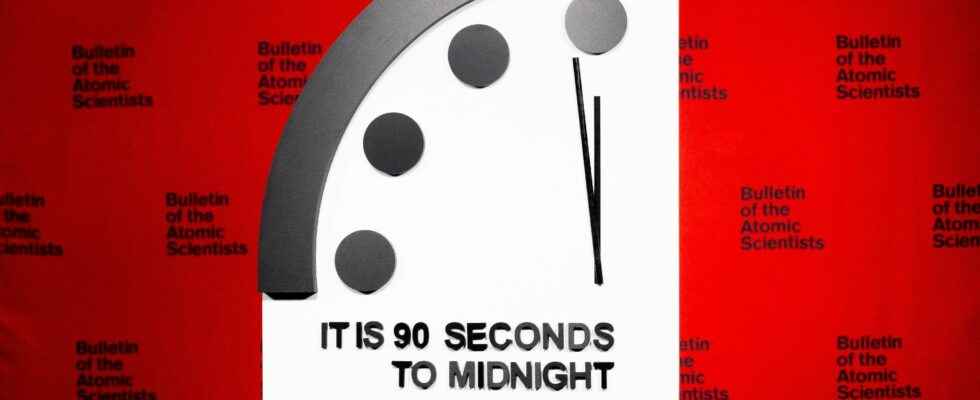According to the doomsday clock, we have never been closer to the end of time. This clock – the Doomsday Clock – was conceived in 1947 by a college of experts from the University of Chicago to alert humanity to the imminence of dangers that could wipe out our species, which would occur at midnight. At the beginning, it was a question of thinking about the risk of recourse to nuclear weapons on a large scale after they had been used in Hiroshima and Nagasaki. We are then at the beginning of the cold war, and the apocalyptic fears legitimately crystallize around the confrontation between the two blocs. Other perils were added in the early 2000s: terrorism, massive computer attacks, global warming and the unpredictable consequences of technological innovations, particularly in the life sciences.
The very concept of this clock is likely to cause concern since it takes the form of an ineluctable time that brings us closer to the end. Right off the bat, Chicago academics set the tone by setting the initial time at 11:53 p.m. (which was already quite late). Admittedly, the clock has rolled back a few times: particularly between 1984 and 1991, a period marked by the gradual collapse of the Soviet Empire and the signing of the Strategic Arms Reduction Treaty. If we believe the Doomsday Clock, humanity is then at the top of its form, but it was all the same 11:43 p.m.… A very relative optimism. Since then, things have gone from bad to worse, since the time that separates us from our end has dropped by 91%!
pop culture object
It must be said that this clock and those who program it are more sensitive to the negative than to the positive. This is not surprising, since the negativity bias is probably one of the most rooted in our minds and also one of the best identified by scientific literature. It designates our disposition to be more permeable to negative information than to positive, through our attention, our memorization, the richness of our evocations and the incentives that the former have on our behavior rather than the latter. And this bias takes its ease on the dial of this Doomsday clock which is deaf to advances in science and technology when both could in some cases be perceived as protective of potential dangers.
Thus, when scientists developed in record time the messenger RNA vaccine against Covid-19 with a technology rich in promise for the cure of certain cancers or the disappearance of several infectious diseases, such as Ebola or HIV, the dial hand remained indifferent. It did not retreat one millimeter either when a significant advance was made last December in nuclear fusion – for the first time more energy was produced by fusion reactions than is necessary to create them – which could, in the (long) term, provide humanity with low-carbon, abundant and waste-free energy. She therefore seems to always have enough motivation to imagine the worst in scientific and technological advances, but never the best. Its designers are no doubt the very consenting victims of a bias which has the advantage of irresistibly attracting our attention and getting people talking about them once a year.
The thing also worked well, since said clock became a kind of pop culture object from the 1980s, where it is mentioned as well under the pen of Stephen King or Dan Brown as in the music of ‘Iron Maiden or Midnight Oil. It is still present in the world of comics, in particular the very famous watch men by Alan Moore, adapted to the cinema by Zack Snyder. However, rather than sharpening our awareness of the perils we run, doesn’t this integration into the stories designed to entertain us rather underline our relative frivolity? This doomsday clock was designed to make us aware that we are dancing near a chasm that we are approaching, but, like any signal that repeats itself in predictable ways, we become oblivious to it. What is happening is the worst that can be imagined for a process that had the ambition to be at the forefront by awakening our consciences and raising the alarm: to become mere entertainment.
